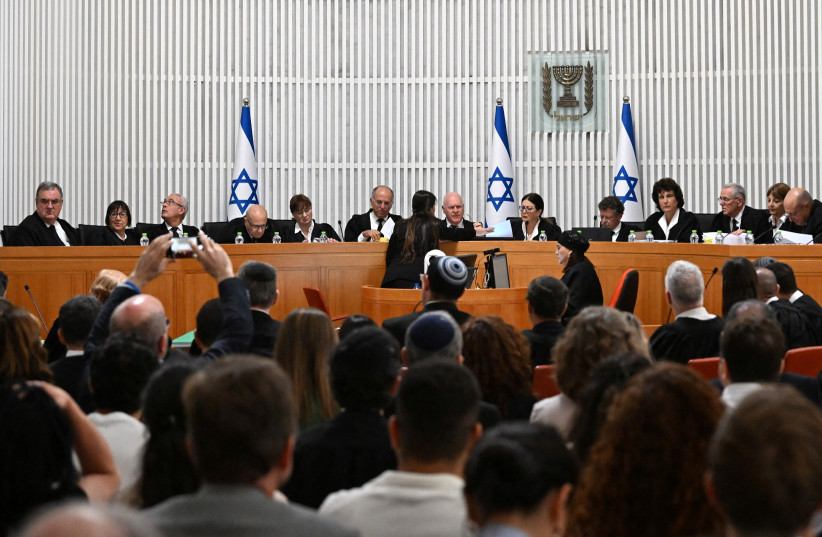Understandably so, everyone is focused on the High Court of Justice’s 8-7 ruling striking down the government’s basic law, which revoked one of the judiciary’s key tools for judicial review, the reasonableness standard.
As they should. The High Court struck down a basic law for the first time, essentially killing the main achievement of Prime Minister Benjamin Netanyahu’s proposed 2023 judicial reform.
But in the long run, the 8-7 decision is less important than the 12-3 decision, the one where an overwhelming majority of the justices voted that some basic laws can be struck down by the High Court. It’s the principle of the matter.
This decision kills the hopes Netanyahu and Justice Minister Yariv Levin had to construct a balance between the branches of government, which would leave the judiciary completely or almost completely out of policy decisions – because even most conservatives on the court may turn on them.
At this point, if Netanyahu et al want to use laws to counteract former chief justice Aharon Barak’s judicial revolution that set all of this in motion, they will need to both shoot for limiting judicial review to almost a unanimous majority and be ready for the possibility that the court may strike down such a law again.

After the fights Netanyahu has picked with the IDF, the Shin Bet, the police, and the attorney-general, is he sure that the enforcement arms of the government would take his side in such a constitutional crisis?
The irony is that Netanyahu had many less polarizing options available that he could have achieved with the support of National Unity Party leader Benny Gantz.
There was a less extreme form of revoking aspects, but not all of the reasonableness standard judicial review tool that Gantz would probably have supported, and probably a majority of the justices would have supported.
Netanyahu also could have just waited until former Justices Esther Hayut and Anat Baron were out of office and then he might not have needed any laws, since the court would have had a 7-6 conservative majority who probably would have let most of his laws pass.
Or, he could have allowed the Judicial Selection Committee to meet and agreed to a compromise, where he chose one justice and Hayut chose one justice, which would have given the conservative wing an 8-7 majority – something Hayut was willing to do.
For those who see this ruling as another activist revolution, they can calm down. The court is about to become 7-6 conservative.
Also, even under Hayut, the court let through several basic laws that were highly political and personal and impinged on several constitutional rights (the Jewish Nation-State Law, various basic laws to create the alternate prime minister position and rotation arrangements, and it is expected that the court will not revoke the competence of the prime minister law.)
The High Court continues to give government after government almost unlimited extensions to address the obvious inequality in giving Haredim exemptions from the IDF.
And for all of the fears that the court would try to nix Netanyahu as prime minister, an 11-0 unanimous majority allowed him to run and form a government in 2020 even though he had already been indicted for alleged bribery.
Those who are thrilled with the decision to strike down this basic law should beware of the future. The judicial overhaul movement did not come from nowhere.
A large alliance of groups in the country, rightly or wrongly, feel that the court has overstepped its bounds on a variety of key issues, most notably the African migrants’ issue, but also on some foreign policy issues where the court is seen as intervening sometimes for the Left, but rarely for the Right.
Why now?
The desire to alter the judiciary’s powers will not just disappear and the ruling to strike down a basic law may supercharge the move.
To that extent, the decision to issue the ruling now, mid-war with Hamas, will only further enrage the court’s detractors and make them view it as more political.
The irony of the timing issue is that it had nothing to do with the war, but simple bureaucracy. Hayut and Baron retired in October and only had weeks left in their three-month post-retirement layover to issue rulings.
They had no choice but to rule now or they would have given up their decisive votes on an issue which they viewed as inextricably linked with their legacies.
If Netanyahu only cared about delaying the ruling only after the war, he easily could have passed an emergency rule allowing the two of them to rule later on the issue, and they would have for sure taken the off-ramp.
In a pre-October 7 world, this might still have played into Netanyahu’s hand for the next move. But in a post-October 7 world, when elections are on the horizon, at most Netanyahu will likely be able to use this as an issue to try to pump up his constituency.
The chances that he will be able to pass a judicial overhaul 2.0 as he is fighting against calls to resign relating to Hamas’s invasion of southern Israel are very low.
So the real question is who will be prime minister when the Judicial Selection Committee finally meets again and whether any other key issues will be decided in the extended interim, when the conservatives will soon have a 7-6 majority for the first time in decades.
